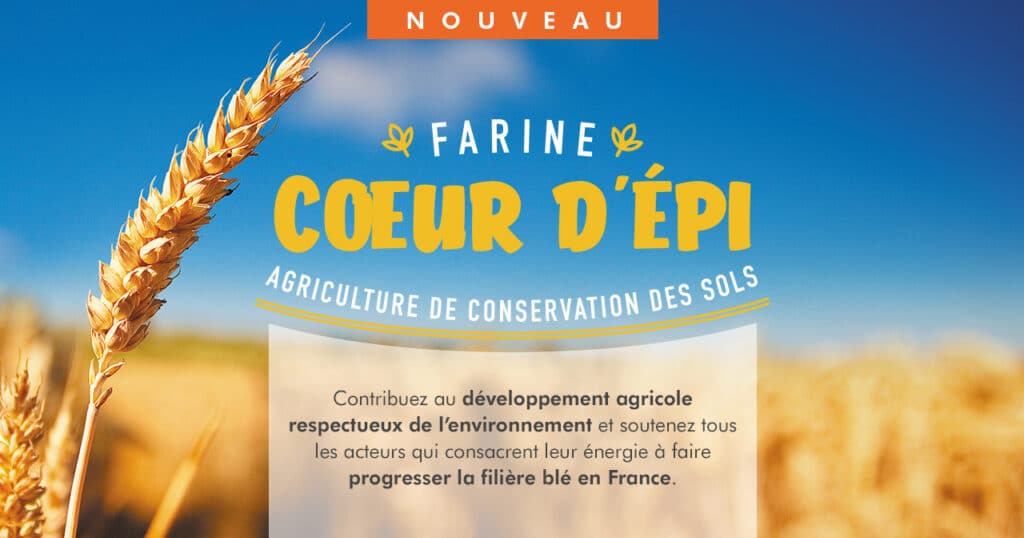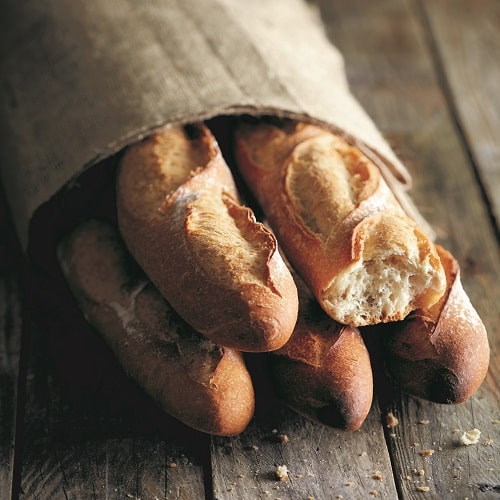
Grands Moulins de Paris renforce son engagement pour plus de responsabilité en développant conjointement une filière 100% groupe dans la démarche d’agriculture de conservation des sols. Cette pratique allie production de qualité en quantité, respect des sols et de leur biodiversité et une meilleure reconnaissance des agriculteurs pour leurs pratiques. Découvrez les témoignages de deux agriculteurs qui ont choisi la démarche cœur d’épi.

Hélène Barthélémy (35 ans) est installée à Fagnières, près de Châlons-en-Champagne (Marne). Elle pratique l’agriculture de conservation des sols depuis qu’elle s’est installée en 2019, à la suite de son père, sur une exploitation de 90 hectares. Elle fait partie des 10 premiers agriculteurs à être entré dans la démarche « cœur d’épi » des Grands Moulins de Paris.
Pourquoi êtes-vous entrée dans la démarche Cœur d’Epi dès son démarrage ?
Je suis très sensible aux produits locaux, alors le contrat filière « Cœur d’épi » qui valorise mes blés dans un moulin proche de chez moi comme celui de Brienne-le-Chateau, situé dans l’Aube, je suis naturellement pour ! J’ai d’ailleurs également des ruches et je vends mon miel dans un rayon de quelques kilomètres autour de l’exploitation en circuit court. Dès mon installation à la suite de mon père, j’ai aussi adhéré aux principes de l’agriculture de conservation des sols qui est une autre caractéristique de cette filière.
Qu’est-ce exactement que l’agriculture de conservation des sols ? Quelles en sont les principales pratiques agricoles ?
L’agriculture de conservation des sols repose sur trois piliers : un abandon du travail du sol et du labour, une couverture permanente des sols et, enfin, une rotation longue et des cultures multi-espèces.
Nous bougeons ainsi le moins possible notre terre et nous y préservons la biodiversité. D’ailleurs, une de mes plus grandes fiertés c’est le nombre de vers de terre dans mes sols ! Nous pratiquons une agriculture toujours verte puisque les sols sont toujours couverts même entre deux cultures. J’associe des cultures comme le colza et la féverole pour que les plantes bénéficient les unes aux autres et enrichissent le sol en nutriments avant d’installer ma culture de blé. Évidemment, l’agriculture de conservation des sols n’est pas toujours simple car il faut s’adapter sans cesse à la météo et aux conditions locales de chaque parcelle. Par exemple j’aurai voulu mettre du trèfle dans une parcelle destinée au blé mais nous n’avons pas eu assez d’eau et il a fallu que je change mon plan initial. J’apprends toujours en matière d’agronomie, d’association des plantes et c’est ce qui rend cette pratique si intéressante.
Comment vous engager dans de telles filières de qualité vous aide-t-il dans votre métier ?
J’ai signé un contrat de trois ans avec ma coopérative Vivescia qui elle-même a un contrat filière avec sa filiale meunerie « Grands Moulins de Paris ». Cela veut dire que nous sommes tous les trois engagés pour produire, collecter et transformer du blé de qualité à un prix fixé. C’est rassurant tout en limitant les risques, car j’engage une partie et non pas toute ma production dans une filière. C’est aussi un engagement raisonnable en terme de prix par rapport à la moyenne des cinq années précédentes. Et je peux présenter cet engagement comme une garantie, par exemple auprès de ma banque que ça rassure également si j’ai besoin d’emprunter pour acheter du matériel.

Francis Martinet (59 ans) exploite, depuis 2012, 175 hectares à Erize la Petite (Meuse) après avoir été mécanicien automobile et salarié en coopérative agricole. Grâce au contrat Cœur d’Epi, il espère que les consommateurs reconnaîtront la qualité de son travail.
Vous intégrez la filière Cœur d’Epi qui valorise la pratique en agriculture de conservation des sols. Pouvez-vous nous en dire quelques mots ?
J’ai signé un contrat de trois ans pour dédier, chaque année, une partie de mon blé, à la filière Cœur d’Epi. Il est écrasé par le moulin de Brienne qui est à 90 km de mes champs. Je produis tout mon blé de la même manière, en pratiquant ce que nous appelons l’agriculture de conservation des sols et le semis direct, c’est à dire que je sème directement dans la végétation, sans labourer. Cette couverture permanente du sol a des effets bénéfiques pour lutter contre le changement climatique avec un bon stockage du carbone dans le sol. Pour que le blé pousse convenablement, je me sers donc des autres plantes, qui font une partie du travail à ma place… grâce à leurs racines qui aèrent le sol et grâce à leur capacité à capter l’azote dont mon blé a besoin. Il faut bien sur faire attention à ce que les mauvaises herbes n’étouffent pas ma culture ou que les campagnols ne dévorent mes grains…
Comment le consommateur peut-il être sûr de la qualité de votre blé ?
Le contrat que nous signons à trois, avec ma coopérative Vivescia et sa filiale meunerie, Grands Moulins de Paris, est lié à un cahier des charges qui indique précisément comment le blé doit être produit, le type de variété de blé, la manière dont il doit être stocké etc. Nous avons des audits régulièrement pour que tout soit vérifié. Cela garantit mes bonnes pratiques agricoles. Par ailleurs, je viens d’obtenir la certification environnementale niveau 2 pour toute mon exploitation et je vais continuer cette démarche de progrès pour obtenir le niveau suivant, la certification HVE (haute valeur environnementale), c’est une façon de reconnaître mes efforts et mon savoir-faire acquis depuis neuf ans au sein de ma ferme. Il faut toujours s’adapter, c’est pour cela que j’appartiens au Club Agrosol de Vivescia, dédié à l’agriculture de conservation des sols, et dans lequel nous avons beaucoup d’échanges avec des techniciens très pointus et mes collègues agriculteurs.
Qu’attendez-vous le plus de cet engagement dans cette nouvelle filière ?
Le contrat reconnaît déjà la qualité de mes blés. En achetant le pain qui est fabriqué à partir de la farine issue de mon blé, le consommateur reconnaît directement la qualité de mon travail. C’est ce qui me paraît le plus important. Nous travaillons chaque jour pour nourrir la population. Nous avons besoin que notre profession soit reconnue. Pour cela, l’agriculteur doit prendre le temps de parler de ses pratiques, de son évolution. De telles filières nous en donnent l’occasion.


